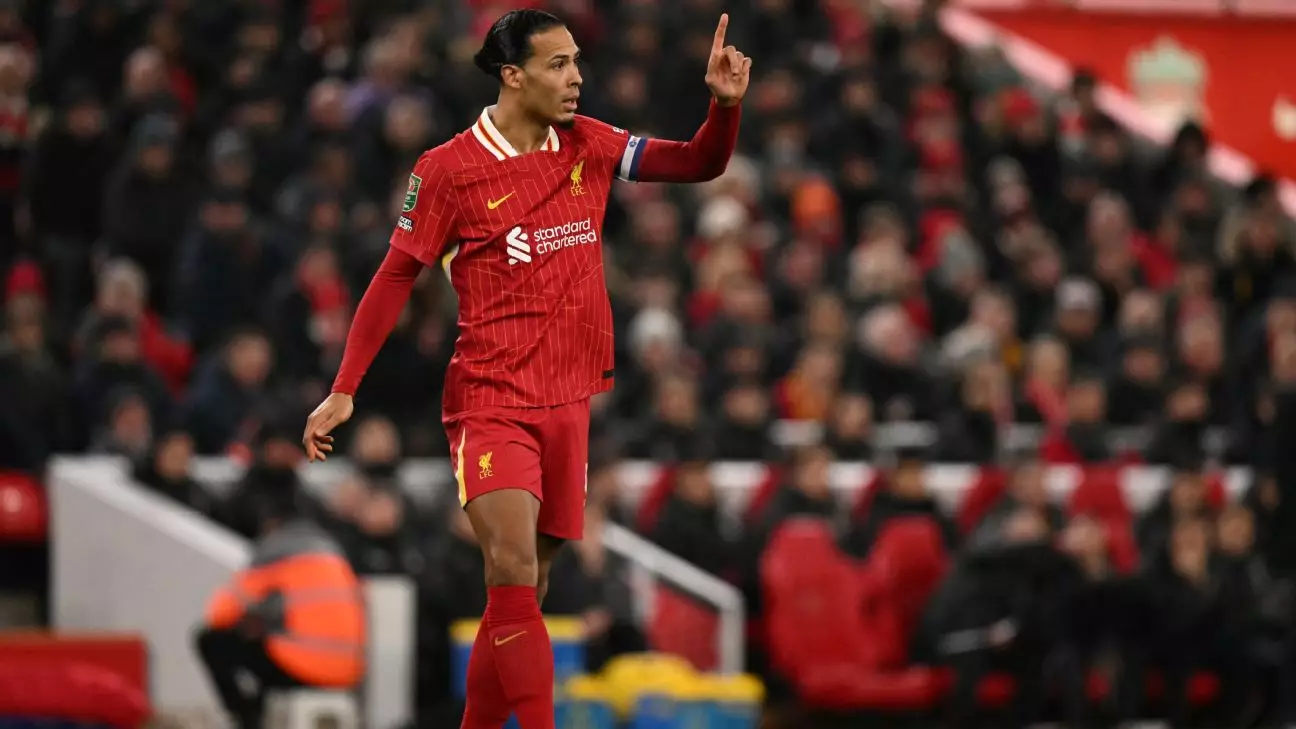On a Sunday that showcased Liverpool’s ascendency in the Carabao Cup semifinals, the Merseyside club did more than just secure a comfortable 4-0 victory over Tottenham Hotspur; they highlighted their depth of talent and tactical superiority. Goals from Cody Gakpo, Mohamed Salah, and Dominik Szoboszlai, along with a contribution from captain Virgil van Dijk, effectively underscored Liverpool’s potency on the attacking front. Crucially, what stood out was the way Liverpool managed to neutralize Spurs—a team known for its attacking flair—by denying them any shots on target throughout the match.
Despite this lopsided scoreline, Van Dijk’s post-match comments reveal a layer of introspection and desire for perfection that speaks volumes about the team’s mindset. Rather than celebrating a routine win, he expressed disappointment with certain aspects of their performance, particularly in the first half. His perspective as a leader reflects a culture of ambition within the squad, where complacency is not an option.
Following the match, Van Dijk articulated a sentiment often echoed in high-performance sports: it’s not merely about winning, but about the manner in which victory is achieved. He emphasized the need for a “complete performance,” lamenting that their intensity could have been higher. This attention to detail is not just for vanity; it’s instrumental in fortifying their championship ambitions. The center-back’s assertion that Liverpool needed to apply more pressure early on indicates a desire to instill an attacking mindset that is relentless, rather than one that grows comfortable with the lead.
Moreover, Van Dijk acknowledged the stoppages that disrupted the rhythm of play, hinting that maintaining momentum is critical in high-stakes matches. His call for increased intensity provides a unique glimpse into the psychology of a team driven not only by results but by the way they achieve them.
Another dimension of the match worth noting is Liverpool’s defensive organization. The team displayed an understanding that modern football requires defensive solidity coupled with pressing aggressiveness. Coach Arne Slot expressed pride in how his players embodied these principles, emphasizing the importance of commitment without the ball. Liverpool executed a tactical plan that not only shut down Spurs’ attacking avenues but also forced them into a series of mistakes—an indicator of the club’s ethos of high work rates and collective responsibility.
The physicality displayed by Liverpool served to stifle Spurs’ attempts to orchestrate play, illustrating that defensive rigor can directly impact the team’s attacking potency. In a competitive landscape where marginal gains make all the difference, Slot’s recognition of his side’s work rate is a testament to the role of conditioning and preparation in their gameplay.
Liverpool’s victory over Tottenham not only secured a place in the Carabao Cup final against Newcastle but also reaffirmed their ambition to challenge for multiple trophies this season. With a commanding position in the Premier League and various cup competitions on the horizon, the stakes couldn’t be higher. This sense of urgency is palpable in the club’s atmosphere as they aim for success on all fronts.
Both Van Dijk and Slot’s perspectives reflect a blend of pragmatism and ambition. They strive for high performance levels, directly correlating their short-term achievements with long-term goals. As they gear up for the FA Cup clash against Plymouth Argyle and eye the Champions League, this relentless approach could be the linchpin in their pursuit of glory.
The 4-0 victory over Tottenham was more than just a demonstration of skill; it was a compelling reminder that for elite athletes and teams, even in victory, there exists a drive for improvement. By demanding higher standards from themselves, Liverpool not only cultivates a winning culture but continues to set the bar for excellence in football.

